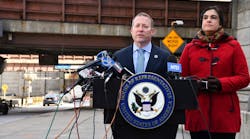Contract negotiations between the Metropolitan Transportation Authority (MTA) and New York City (NYC) Transit Workers Union (TWU) 100 have officially begun. Labor will want salary increases that align with inflation. Two years ago, inflation was four percent. Last year, it grew to over eight percent, and it continues to grow in 2023.
The MTA previously budgeted only two percent per year for the next round of labor contracts. What the NYC TWU Local 100 obtains, both Long Island Rail Road and Metro-North Rail Road unions with thousands of members will want. TWU President Richard Davis, who represents 40,000 bus and subway workers, has made clear to the MTA they should not try to nickel and dime or balance the agency budget on the backs of workers during contract negotiations.
He is looking for higher wages, better health care, six months of parental/maternity leave, mental health benefits and improved pensions along with ending ceilings on overtime pay counting toward pensions. This could add billions over coming years to the current multi-billion dollar, multi-year MTA financial shortfall. In 2022, the MTA lost $700 million due to fare evasion.
It is doubtful this will be significantly reduced in 2023. It will also require many more years before ridership returns to pre COVID-19 levels accompanied by matching farebox revenue. Employee overtime continues to average over $1 billion yearly. Add another $15 billion shortfall to the current MTA $51 billion 2020 - 2024 Five Year Capital Plan without Congestion Pricing Toll Revenues.
MTA Chairman Janno Lieber acknowledges the MTA has consistently failed to successfully negotiate future union contracts to include more flexible work assignments. During contract negotiations, the MTA must insist future union contracts include more flexible work assignments. This practice is becoming more and more common with many other city, county, state and federal agencies. The option to contract out more work to the private sector or hiring part time employees must be more readily available as appropriate without sacrificing the safety and system reliability that riders count on.
Salary increases should never exceed the consumer price index. Employees need to increase contributions toward medical insurance and retirement pensions just as other government, private sector employees, taxpayers and commuters do. Future pensions must be calculated based on the final year's base salary and not inflated by overtime. Federal civil servants pensions are calculated based on average for the last three years of employment. Overtime is not included in determining the pension of federal employees. Allow MTA workers to remain part time while collecting a portion of their pension. This affords experienced employees time to train replacements and be available during emergencies.
Many federal agencies already offer this opportunity to employees who are contemplating retirement. A larger pool of employees, including part-time, could help deal with morning and evening peak service requirements. Allow unions to bid on projects like the private sector. Offer union employees bonuses like outside vendors when completing projects ahead of schedule or under budget. Share these cost savings with union employees.
MTA Management, unions, riders, taxpayers, along with city, state and federal government that provides both capital and operating assistance all must do their fair share. This is necessary to insure continued success of safe and reliable public transportation in the MTA service area that millions of daily riders count on.
------------------
Larry Penner is a transportation advocate, historian and writer who previously served as a former director for the Federal Transit Administration Region 2 New York Office of Operations and Program Management. This included the development, review, approval and oversight for billions in capital projects and programs for New Jersey Transit, New York Metropolitan Transportation Authority, NYC Transit bus, subway and Staten Island Railway, Long Island and Metro North railroads, MTA Bus, NYCDOT Staten Island Ferry along with 30 other transit agencies in New York and New Jersey.
------------------

Larry Penner
Larry Penner is a transportation advocate, historian and writer who previously served as a former director for the Federal Transit Administration Region 2 New York Office of Operations and Program Management. This included the development, review, approval and oversight for billions in capital projects and programs for New Jersey Transit, New York Metropolitan Transportation Authority, NYC Transit bus, subway and Staten Island Railway, Long Island and Metro North railroads, MTA Bus, NYCDOT Staten Island Ferry along with 30 other transit agencies in New York and New Jersey.




